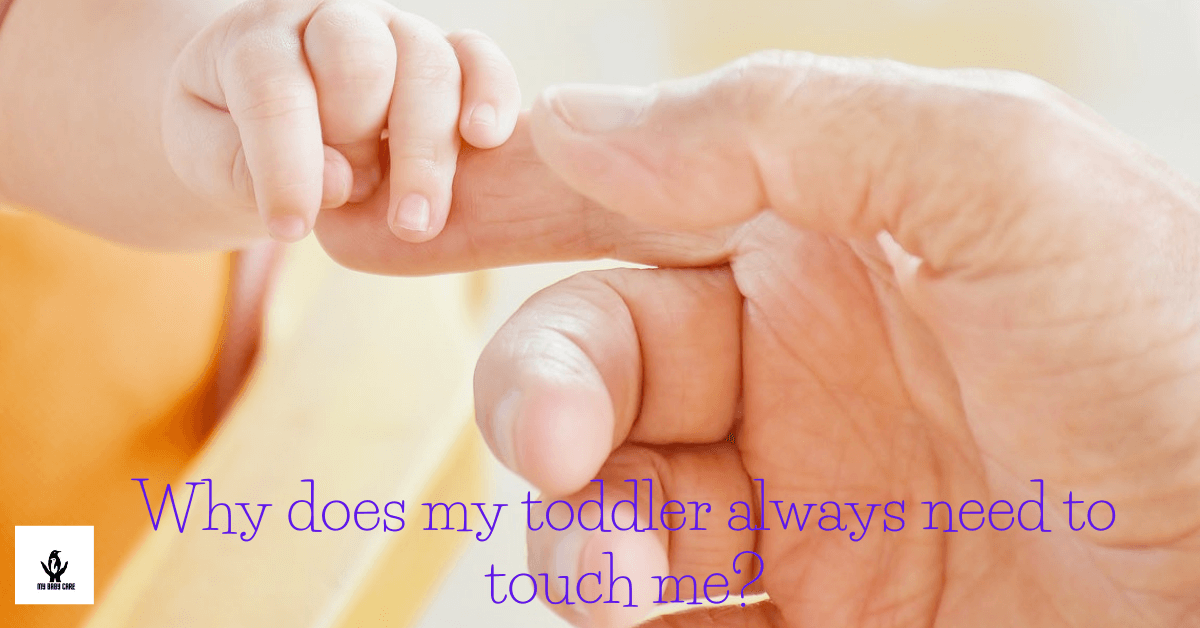Some children move all over the lace. They touch all the things and they try to bump into objects. Parents ask “why does my toddler always need to touch me.” They seek movement in every activity they engage in. The goal of these activities is to regulate their own body from various discomforts.
If you see a child who tends to touch everything, they need more sensory inputs and they can be named sensory seekers. They need to self-regulate their body transform into normal kids.
Most parents say that it is a common thing for their children to sensory seeking by touching others all the time and being aggressive by seeking movement. They say “he’s just being a boy and it is normal to have that hyper behavior.”
The boys or girls who seem to have a lot of energy may be acting this way in order to fulfill their sensory needs. Fulfillment of those sensory needs allows them to function to their best abilities.
Table of Contents
1. How much affection does your child need?
You probably may have an overly touchy-feely child. Is it a normal thing or an indication of another condition? The affection of children with their mom starts from their birth as a very normal procedure.
When your child is continuously interacting with you and others, It may a problem. How it comes the over-touchy with regard to your baby? It should be a concerning thing.
Cuddling your baby is not the wrong thing. But if you feel is it too much for you to handle your baby. Answer the following questions then you can identify whether there is a problem with your child.
- Is the level of affection a problem for you and other people?
- Do feel this is a future problem?
- Do you guess that your child is seeking affection for requesting things?
- Do you take more time with handling your kid?
So this over-touching of your baby may come as a seeking of constant affection and hyperactivity.
How can you be affectionate to your kid?
It is worth knowing the special term called love language by Gray Chapman when discussing this topic. Chapman says you need to provide physical touch, quality time, words of affirmation, acts of service, and receiving gifts when you give or receive your love for people.
When you deal with children, you can apply the same thing to them. Sometimes your baby may seek the main components of the love language that I spoke above.
So they need physical touch and love language. Also, they need to spend quality time with parents with love language. So they seek affection from their parents.
But the conditions such as sensory processing disorder and AUTISM, the situation gets different. Here they can not satisfy the amount of affection and touching that they want. So they do odd behaviors to fulfill additional sensory input through touching and affection
If the physical touch is low, this could feel uncomfortable or annoying to your kid, and then they are behaving oddly. So try to create instant daily rituals to stay with your kid and spend more time one-on-one time. It could make them safer and feel comfortable.
Following behavioral hacks might help you.
- a proper nighttime routine. read a storybook before bed.
- Make more enjoyable bath time
- Have a chat about daily activities while going to sleep.
- preparing and eating dinner together.
- Select a game to play every day.

How does it convert overly affectionate?
Think about personal space. Even though they are kids, the younger school children try to maintain a personal space most of the time. So you can observe whether they maintain sufficient personal space. if not underlined cause it may be there most of the time.
If the child is not meeting his/her sensory needs adequately, that is a common time they show overly affection to the parents. You can get professional support from occupational therapists for this problem. It is very advisable to get professional assistance for your baby.
Overly affectionate can be a sign of sensory processing disorder.
It is widespread for most kids to process senses properly in day-to-day life. If they can’t process senses properly the following signs are very common among them.
- They can’t complete given tasks
- Difficulty in making friends
- They become overwhelmed in busy places
- Easily distracted
- Reading problems
- Clumsiness
- Constant moving
2. How do you help your sensory seeker?
The first thing is to get professional assistance when you are suspecting sensory processing issues with your kid. You can assist your healthcare practitioner to find a few details about your child’s condition prior to you going to them. Your child needs to get
- Enough activity
- Enough attention
- if they have a sense of the normal boundaries
- Which type of sensory types they are seeking?
Then plan a few enjoyable sensory activities at your home with the kid.
- Combine with them for the household activities
- YOu can do a few kitchen activities with cleaning stuff etc.
- Let their bum on the sofa and play.
- Buy a rocking chair or bean bag for them.
- Try with weighted—blankets at bedtime and nighttime routine.
3. This is high time to teach the concept of boundaries
Every bad aspect can be converted into a good opportunity to teach. Most of the time kids don’t know that adults become so uncomfortable due to overly touchy behavior. So let them know about that.
As parents, we can use everything as an opportunity to teach. Let him/her know you have had enough for now. You can compare them with another sibling.
Reading stories with morels and values will shape will child gradually. meanwhile, you can seek qualified professional assistance to tackle the matter.
4. Occupational Therapy to help with regulation and sensory processing
1. Sensory problems can arise as constant movement issues. These kids are having vestibular-seeking behaviors and low muscle tone issues. Due to the law of muscle tone problems, these kids contract their muscle groups less commonly than normal kids.
So they need to do more contractile forces for their muscles to strengthen them. To do that task they continuously move here and there by throwing their body parts. occupational therapists can design various activity types to fulfill their needs.
2. Few kids are bumping and crashing into the furniture and doors. They expected to get shock absorption sensory inputs to self-regulate their body. They try to give force to their muscles and joints.
They have higher pain tolerance and parents should pay attention to the kids who tend to do bumping and crash frequently.
Talk with your occupational therapist and get suggestions regarding kids’ activity types, home modification, a behavior modification of the kids to get the best results.
3. Behavior Vs sensory issues
Some children exhibit aggressive behaviors when they have sensory issues. They apply too much pressure when they play with friends. They show excessive unnecessary force to other kids while playing and during performing other tasks.
So your Occupational therapist can guess which area the sensory deficit is with your kid. They organize their treatment plan according to that.
4. The tactile sensory-seeking kids are touching everything in front of their eyesight. Also seeking tactile inputs by touching and rubbing the parent’s body and others.
So planned tactile input sensory program will resolve this issue. A detailed assessment is done by your occupational therapist and he/she will plan your kid’s treatment accordingly.
5. If your kid is unable to follow directions and unable to respond when somebody calls their name, those kids can not filter the irrelevant information in their environment.
An occupational therapist can find out whether there is a hearing sensory processing problem with the kid or grow proper listening skills with the kid.
6. Making loud noises may be a sensory processing problem. So your occupational therapist will address any auditory processing issue of your kid by doing various assessment types.
5. Final Thoughts
Constant touching of your toddler is more likely to have sensory-seeking behavior. Especially tactile sensory-seeking behavior. These behaviors are associated with hyperactivity and behavior problems most of the time.5.
An only touchy child may seek their sensory inputs with various sensory types in addition to tactile sensation. That may be hearing, vision, smell, proprioception ( joint positioning ), smell, and taste. But they have a tactile sensory deficiency more prominent than the other senses.
It is advisable for you to seek professional assistance when dealing with these issues.

